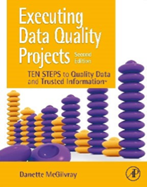Introduction
Ten Steps to Quality Data
Overview 🙂
Increase your organization’s success by addressing the data quality aspects of your business efforts. Learn a practical, flexible approach to creating, improving, and managing the quality of data on which your business depends.
Based on the book:
Executing Data Quality Projects: Ten Steps to Quality Data and Trusted Information™ 2nd Edition (Elsevier/Academic Press, 2021) by Danette McGilvray

Why This Course
We live in a data‐dependent world. Having high-quality data is more critical than ever before. Do you trust the data that is used in decision-making and operational processes in your organization? Can you rely on the quality of the data which supports data-driven initiatives such as analytics, data science, and artificial intelligence/machine learning? Poor-quality data can increase risk and costs and decrease the value of your organization – whether you are for-profit in any industry, or a non-profit, government, education, or healthcare organization. High‐quality, trustworthy data supports whatever initiatives your organization wants to accomplish. Is the quality of that data up to the task? If not, this course is for you!
Audience
Individual contributors and team members responsible for or interested in the quality of data in their business processes, systems or databases. This includes roles such as:
- Data Analyst
- Data Quality Analyst
- Business Analyst
- Data Designers/Modelers
- Data Stewards
- Business Process Modelers
- Application Developers/Programmers
- Data Architect
- Any data professional impacting the quality of data upon which their business depends
This class has also proven helpful for:
- Managers and Project Managers of individual contributors and team members; who need to understand what is involved in addressing data quality because they hire resources, assign people’s time, provide support, and remove roadblocks to data quality work.
- Users of data; whose work has been affected by poor data quality and want to find solutions for those problems, such as data scientists who have found themselves in a position of dealing with poor-quality data before they can start the ‘real’ job for which they were hired.
What You Will Learn
Through presentation, group discussion, individual exercises and a course project, attendees will be able to:
- Address any data quality challenge by using the Ten Steps methodology – a proven approach for creating, improving, sustaining, and managing data and information quality within any organization
- Show the impact of poor-quality data – both quantitatively and qualitatively
- Prioritize which issues are most important to address first
- Use the holistic Ten Steps approach to complement other data work (data governance, data management, modeling, etc.)
- Bring real value to their organization by addressing the quality of their essential data assets
After attending the Ten Steps to Data Quality course, attendees will have the background needed to conduct their own data quality project using the Ten Steps methodology ‐ a proven approach for creating, improving, sustaining, and managing data and information quality within any organization.
More About This Course
Simply put, information quality is providing the correct set of accurate information, at the correct time and place, to the correct people. However, ensuring quality information is far from simple. Whether you are just starting a project or are already in production, it is not unusual to find that data quality issues prevent organizations from realizing the full benefit of their investments in business processes and systems.
Join us to learn the Ten Steps to Quality Data and Trusted Information™ – a practical, flexible approach to creating, improving, and managing the quality of information critical to running your business, satisfying customers, and achieving company goals. If you are working on real data quality‐related issues that need real results, this is the course for you. What you learn here applies to all kinds of data and every type of organization – for‐profit businesses of all sizes, education, government, healthcare, and nonprofit – because all depend on trusted information to succeed.
Both foundational data quality concepts and practical instruction are included. Be prepared to participate as this is a highly interactive course. Class discussion and exercises (both individual and with teams) are an integral part of the seminar. In addition, attendees have the opportunity to apply what is learned to a course project, chosen from their real data quality situations and concerns. Come with your particular needs in mind, learn how these topics apply to your situation and leave with realistic methods for improving information quality.
This course is based on the extensive experience of the trainer/author/consultant, Danette McGilvray, and her book Executing Data Quality Projects: Ten Steps to Quality Data and Trusted Information™ 2nd Edition (Elsevier/Academic Press, 2021).
Course Outline
Foundation
- About you and your organization
- Data-dependent world
- What we need: high-quality data
- Information and data quality defined
- Data in action
Key Concepts – A Necessary Foundation for Addressing Data Quality
Concepts provide a foundation for understanding data quality so attendees can make good choices for their situations when concepts are put into action throughout the Ten Steps™ process.
- Data is an asset
- Framework for Information Quality and the Information Life Cycle (a.k.a. lineage)
- Data specifications, data categories, data governance, and their part in high-quality data. This includes data modeling, metadata, business rules, master data, reference data, and data standards.
- Tool functionality that helps with data quality work is discussed throughout. The Ten Steps is tool-independent, but applying the Ten Steps will help you make better use of the tools you have and identify tools you may need.
Structuring Your Project
- To successfully apply the Ten Steps methodology, it is essential to do a good job of organizing your work
- This section discusses the broad definition of “projects” as it relates to data quality work, types of projects, and how the Ten Steps can be applied in various ways to address a myriad of situations where data quality is a component
Step-by-Step: The Ten Steps™ Process
Each of the Ten Steps is covered with instructions, techniques, examples, templates, and best practices. Data quality tools are discussed in the applicable steps. Attendees practice what is learned through exercises and working with small teams on a course project
Step 1 – Determine Business Needs and Approach
- Connect data quality issues with business priorities
- Turn data quality challenges into actionable projects with clear objectives
- Determine project type and how work will be organized
- Select the steps, activities, and techniques from the Ten Steps™ process most appropriate to your business needs, data quality issues, and project objectives
Step 2 – Analyze Information Environment
The information environment refers to the settings, conditions, and situations that surround, or may have created or worsened data quality problems within the scope of your work
- Make use of what is already known about the information environment and conduct additional research as needed
- The information environment includes: requirements and constraints, data and data specifications, processes, people and organizations, technology, and the information life cycle
- This ensures that relevant data will be assessed for quality and provides input to future steps, such as when identifying root causes
Step 3 – Assess Data Quality
Overview of various data quality dimensions, which are used to define, measure, improve, and manage the quality of data and information. Learn how to:
- Select the data quality dimensions applicable to your business needs and data quality issues
- Design and execute a suitable data capture and assessment plan
- Make use of data quality assessment results: analyze individual assessments and synthesize with other results; make initial recommendations, document, and take action when the time is right
Step 4 – Assess Business Impact
- Determine the impact of poor-quality data and the value of high-quality data using a variety of qualitative and quantitative techniques
- These techniques are used anytime throughout a project whenever there is a need to: address resistance to data quality work, establish the business case for improvements, gain support for information quality, and determine appropriate investments in your data assets
Step 5 – Identify Root Causes
- Use root cause analysis techniques to address the true causes of data quality issues
- Develop specific recommendations for addressing the problems
Step 6 – Develop Improvement Plans
- Finalize specific recommendations for prevention and correction
- Develop improvement plans based on the recommendations
- Establish ownership for implementation
Step 7 – Prevent Future Data Errors
- Implement solutions that address the root causes of the data quality problems and will avoid data errors from reoccurring
Step 8 – Correct Current Data Errors
- Make appropriate data corrections
- Ensure data corrections do not introduce new errors
Step 9 – Monitor Controls
- Monitor and verify the improvements that were implemented
- Maintain improved results by standardizing, documenting, and monitoring appropriate improvements
Step 10 – Communicate, Manage, and Engage People Throughout
- Communication, engaging with people, and managing the project throughout is essential to the success of any data quality project
- These are so important that they should be included as part of every other step and are discussed throughout the course
Course reviews
“What an excellent class and instructor. I know I will be using the methodology that was taught in this class. This was the best data quality related class I’ve attended.”
“The class was great and could really help me with some of the challenges that we are currently facing.”
“Great course ‐ should be required … as we move toward implementing on‐going data quality efforts.”
“Effective class that I will be able to use on my job.”
Educator:
Danette McGilvray

Danette McGilvray is president and principal of Granite Falls Consulting, Inc., a firm that helps organizations increase their success by addressing the information quality and data governance aspects of their business efforts. With a focus on bottom-line results, Granite Falls helps organizations enhance the value of their information assets by connecting their strategy to practical steps for implementation. We also emphasize the importance of communication and human factors affecting the success of their business goals, issues, strategies, and opportunities.
Danette is the author of Executing Data Quality Projects: Ten Steps to Quality Data and Trusted Information™ 2nd Ed. (2021, Elsevier/Academic Press). An internationally respected expert, her Ten Steps™ approach to information quality has been embraced as a proven method for creating, improving, sustaining, and managing information and data quality in any organization. Her book is used as a textbook in university graduate programs. The Chinese translation of the first edition was the first data quality book available in Chinese.
A skilled facilitator, program and project manager, she has worked with people at all levels of the organization and from most functional areas, giving her a valuable perspective on organizational challenges based on real-life experience. Danette has helped organizations in industries as varied as biotech, pharma, insurance, banking, retail, automotive, financial services, direct selling, utilities, higher education, energy, and water management. Danette is a popular speaker and has taught her highly-rated courses in several countries.
With her holistic approach to data quality, Danette believes that data quality can save the world. She loves to work with organizations that want to increase their data literacy and build expertise in-house. She helps through consulting, training, one-on-one coaching, and executive workshops and presentations. Please contact her at [email protected], connect with her on LinkedIn, and follow her on Twitter: Danette_McG.
Learn more about Granite Falls and Danette at http://www.gfalls.com
Arvostelut
“What an excellent class and instructor. I know I will be using the methodology that was taught in this class. This was the best data quality related class I’ve attended.”
“The class was great and could really help me with some of the challenges that we are currently facing.”
“Great course ‐ should be required … as we move toward implementing on‐going data quality efforts.”
“Effective class that I will be able to use on my job.”
Educator:

Danette McGilvray
Danette McGilvray is president and principal of Granite Falls Consulting, Inc., a firm that helps organizations increase their success and enhance the value of their information assets by addressing the information quality and data governance aspects of their business efforts.
Danette is the author of Executing Data Quality Projects: Ten Steps to Quality Data and Trusted Information™, (Morgan Kaufmann Publishers, 2008 and 2021). She has trained Fortune 500 clients and workshop attendees around the world, her book is used as a textbook in university graduate programs.
Read more
Theme:
Educator:
Danette McGilvrayLanguage:
EnglishDuration:
3 daysLocation:
Remote training 8.45-17.00Koulutusohjelmalla / kurssilla ei ole aktiivisia aloituspäivämääriä, jos olet kiinnostunut kurssista ota yhteyttä.
ContactPlease contact:
More than one participants from same company?
We also organize company-specific courses.
You might be interested in
- High-quality all-inclusive teaching - always.
- Well-selected world-class trainers.
- Always practical knowledge and concrete benefits.